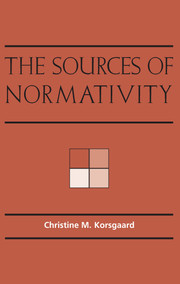Book contents
- Frontmatter
- Contents
- Notes on the contributors
- Acknowledgments
- Introduction
- Prologue: Excellence and obligation a very concise history of western metaphysics 387 bc to 1887 ad
- 1 The normative question
- 2 Reflective endorsement
- 3 The authority of reflection
- 4 The origin of value and the scope of obligation
- 5 Reason, humanity, and the moral law
- 6 Morality and identity
- 7 Universality and the reflective self
- 8 History, morality, and the test of reflection
- 9 Reply
- Bibliography
- Index
2 - Reflective endorsement
Published online by Cambridge University Press: 20 May 2010
- Frontmatter
- Contents
- Notes on the contributors
- Acknowledgments
- Introduction
- Prologue: Excellence and obligation a very concise history of western metaphysics 387 bc to 1887 ad
- 1 The normative question
- 2 Reflective endorsement
- 3 The authority of reflection
- 4 The origin of value and the scope of obligation
- 5 Reason, humanity, and the moral law
- 6 Morality and identity
- 7 Universality and the reflective self
- 8 History, morality, and the test of reflection
- 9 Reply
- Bibliography
- Index
Summary
under what conditions did man devise these value judgments good and evil? and what value do they themselves possess? Have they hitherto hindered or furthered human prosperity? Are they a sign of distress, of impoverishment, of the degeneration of life? Or is there revealed in them, on the contrary, the plenitude, force, and will of life, its courage, certainty, future?
NietzscheINTRODUCTION
At the end of the last lecture I argued that normativity is a problem for human beings because of our reflective nature. Even if we are inclined to believe that an action is right and even if we are inclined to be motivated by that fact, it is always possible for us to call our beliefs and motives into question. This is why, after all, we seek a philosophical foundation for ethics in the first place: because we are afraid that the true explanation of why we have moral beliefs and motives might not be one that sustains them. Morality might not survive reflection.
The view I am going to describe in this lecture takes its starting point from that thought. It applies one of the best rules of philosophical methodology: that a clear statement of the problem is also a statement of the solution. If the problem is that morality might not survive reflection, then the solution is that it might. If we find upon reflecting on the true moral dieory that we still are inclined to endorse the claims that morality makes on us, then morality will be normative. I call this way of establishing normativity the ‘reflective endorsement’ method.
- Type
- Chapter
- Information
- The Sources of Normativity , pp. 49 - 89Publisher: Cambridge University PressPrint publication year: 1996
- 3
- Cited by



